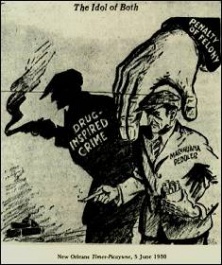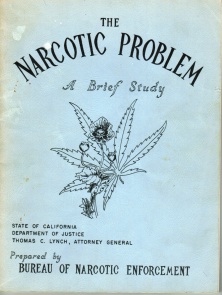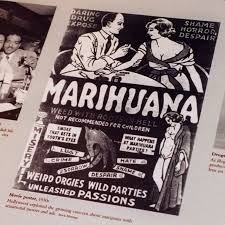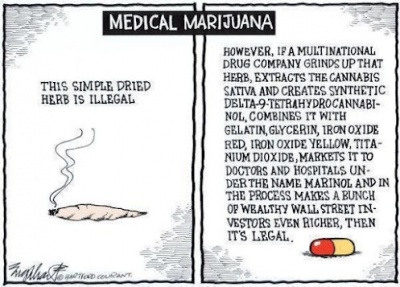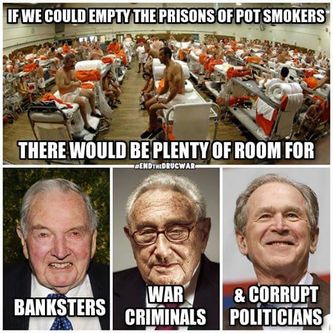Cannabis
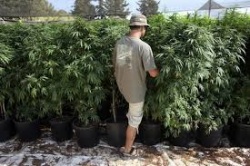 | |
| Type | plant, drug |
| Interest of | • Sue Grey • Martin A Lee • Bob Marley • Salem News |
| Easily grown around the world, with a long history of medical and recreational use, 'weed' is the world's most popular recreational drug. | |
Cannabis sativa is an easily grown plant with a long history of use for medical and recreation purposes. One of the world's most widely used drugs, as of 2016 it remains illegal in most countries of the world, with those who are caught possessing it facing harsh penalties, even including the death penalty.[1][2]
Contents
Official narrative
The DEA’s position on marijuana has remained relatively unchanged since 2011, when it produced The DEA Position on Marijuana[3] which ignored the range of long established medical uses and cited “getting arrested,” “gum disease” and “disobedience” as evidence of the drug’s harm.
History
Cannabis has a long history of use stretching back into pre-history. However, it was not widely used as an intoxicant in USA until the early 20th century. Cannabis was subject to a devoted campaign by Harry Anslinger. The propaganda materials were not only explicitly racist, but so false as to be laughable from a modern perspective - but since the US public was unfamiliar with the drug, the Federal Bureau of Narcotics was successful at demonizing it.
Several scholars have claimed that Andrew Mellon, who created the Bureau of Narcotics and put Anslinger in charge of it, may have been motivated by a desire to prevent a fall in his investments in the US timber industry. The legislation against cannabis applied equally to hemp (which has minimal psychoactive purposes), which was starting to become a potential rival to the long established use of wood pulp to produce paper. If true, this is a close parallel with John D. Rockefeller's support of alcohol prohibition as a means of preventing ethanol threatening his petroleum monopoly.
Medical Marijuana
Marijuana is proven to be effective at treating a number of medical issues, including some for which no pharmaceutical medicine is available. Active ingredients from marijuana have been isolated by drug companies and sold in pill form, which is outside the remit of the Drug Enforcement Administration.
Medical marijuana has been a subject of much campaigning in recent years in USA (and worldwide) and has been legalized by an increasing number of US states. Surveys suggest that its legalisation could hit the profits of big pharma.[4]
UK Home Office
The UK Home Office stated that they recognise "that people with chronic pain and debilitating illnesses are looking to alleviate their symptoms. However, it is important that medicines are thoroughly tested to ensure they meet rigorous standards before being placed on the market, so that doctors and patients are assured of their efficacy, quality and safety."[5]
DEA's Profiteering
Jesse Ventura termed the DEA "Judge and Jury on Marijuana", after their unilaterally decision that cannabis should remain in the same legal classification as heroin - deadly, addictive and with no known medical value. As he observed, it was obvious that they would do this, to protect their income stream.[6]
Legal status
- Full article: War On Drugs
- Full article: War On Drugs
Several countries, such as Portugal, the Netherlands and almost all of South America have de facto decriminalised cannabis, while as of 2017 it is legal in a few countries, such as Uruguay and South Africa. In USA, many states have legalised cannabis for medical purposes, and in July 2017, Nevada became the fifth US state to legalise marijuana for recreational purposes.[7] As of December 2017, several other states were exploring legalisation or decriminalisation options.[8] Canada is legalised cannabis in October 2018, although it was still subject to some legal restrictions.[9]
Stiff sentences for use of cannabis, combined with mandatory minimums, have created a dramatic rise in the number of prisoners in US prisons, of which cannabis users form a considerable proportion. Alleviating prison overcrowding is one argument used in favour of legalisation of cannabis.
Related Document
| Title | Type | Publication date | Author(s) | Description |
|---|---|---|---|---|
| File:Cannabis comparative risk assessment.pdf | Report | 30 January 2015 | Jürgen Rehm Dirk Lachenmeier | Comparative risk assessment of alcohol, tobacco, cannabis and other illicit drugs using the margin of exposure approach |
References
- ↑ http://www.ccguide.org/deathpenalty.php
- ↑ https://web.archive.org/web/20041107125819/http://www.ukcia.org/news/shownewsarticle.php?articleid=9705
- ↑ https://www.muckrock.com/foi/united-states-of-america-10/dea-csa-enforcement-in-states-with-legal-marijuana-use-10465/#file-25355
- ↑ http://yournewswire.com/big-pharma-not-happy-80-of-cannabis-users-give-up-prescriptions-drugs/
- ↑ https://www.thecanary.co/discovery/news-discovery/2018/06/11/a-mum-just-risked-arrest-to-get-her-son-life-changing-medication/
- ↑ http://www.counterpunch.org/2016/08/19/the-dea-judge-and-jury-on-marijuana/
- ↑ https://whowhatwhy.org/2017/07/15/nevada-welcomes-marijuana-jeff-sessions-not/
- ↑ http://thegolder.com/legalizing-pot-fo-sc-medical-use-could-bring-unintended-consequences-2/
- ↑ https://www.usatoday.com/story/money/2018/10/17/pot-stocks-canada-legalizes-marijuana/1668186002/

